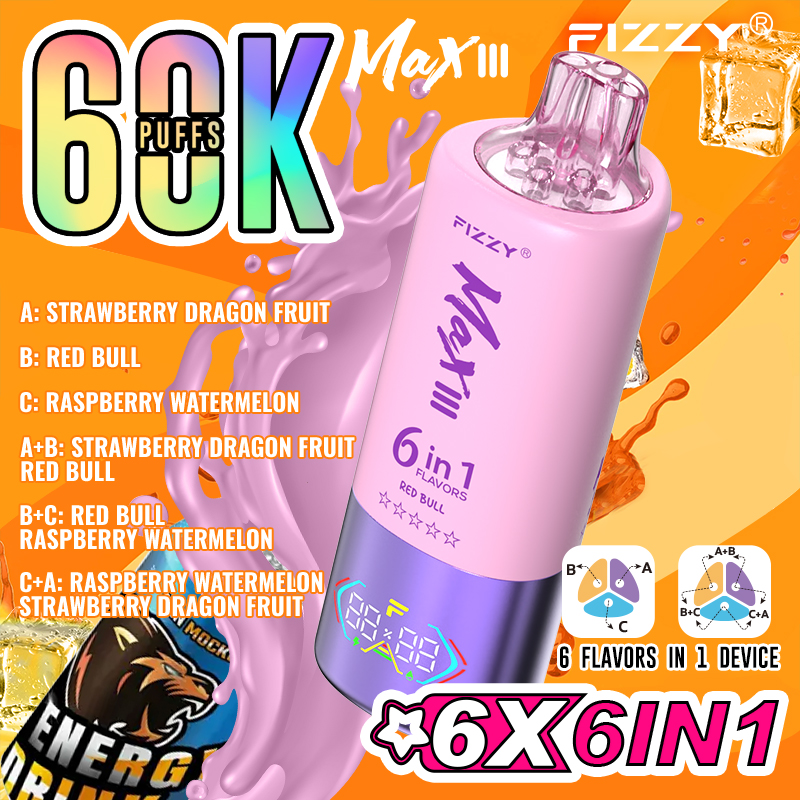Are disposable vapes as bad as cigarettes?
2025-06-16
That's a really important question, and the answer isn't a simple yes or no. Here's a breakdown of the key points:
1. **Disposable vapes are generally considered LESS harmful than traditional cigarettes:** This is the consensus view of major public health bodies (like Public Health England and the Royal College of Physicians), based on current evidence.
* **Why? Combustion vs. Aerosol:** Cigarettes work by burning tobacco, which produces thousands of chemicals, including over 70 known carcinogens (like tar, benzene, formaldehyde) and harmful gases like carbon monoxide. This combustion process is the primary cause of smoking-related diseases (cancer, heart disease, COPD, stroke).
* Vapes (including disposables) *heat* a liquid (e-liquid) to create an aerosol (vapor), *without* burning tobacco. This process generally produces significantly fewer harmful chemicals and at much lower levels than cigarette smoke.
2. **However, disposable vapes are NOT SAFE or "harmless":**
* **Nicotine:** Both deliver highly addictive nicotine. Nicotine harms adolescent brain development, is addictive for all ages, and can negatively impact cardiovascular health (raising blood pressure and heart rate).
* **Other Chemicals:** While less numerous and at lower levels than cigarette smoke, the aerosol from vapes *does* contain potentially harmful substances:
* **Ultrafine Particles:** Can irritate lungs and be inhaled deep into lung tissue.
* **Flavorings:** Many flavoring chemicals (like diacetyl) are safe to eat but have unknown or known risks (like "popcorn lung") when inhaled. The long-term effects of inhaling these chemicals are still being studied.
* **Volatile Organic Compounds (VOCs), Heavy Metals (trace amounts):** Can come from the device or e-liquid components.
* **Propylene Glycol (PG) & Vegetable Glycerin (VG):** The base liquids. Generally recognized as safe for ingestion, but their long-term effects of *inhalation* are not fully understood. They can cause throat irritation and dry mouth.
* **Unknown Long-Term Risks:** Cigarettes have been studied for decades, with well-established, devastating health consequences. Disposable vapes are relatively new. While likely *much* less harmful than smoking, the **long-term health effects (over 20, 30, 50 years) of vaping are still unknown.** It will take decades of research to fully understand the risks.
* **EVALI (2019 outbreak):** While primarily linked to vitamin E acetate in illicit THC cartridges (not standard nicotine vapes), it highlighted the potential for severe acute lung injury from contaminated or poorly manufactured vaping products.
* **Youth Use & Addiction:** Disposable vapes, with their appealing flavors, ease of use, and high nicotine content (often 5% or more - equivalent to a pack of cigarettes), are driving a significant increase in nicotine addiction among youth who never smoked. This is a major public health concern.
* **Environmental Harm:** Disposable vapes create significant electronic waste (batteries, plastics, heavy metals) and are rarely recycled properly, posing environmental problems cigarettes don't have on the same scale.
**Key Differences Summarized:**
| **Feature** | **Cigarettes** | **Disposable Vapes** |
|---------------------|----------------------------------------|------------------------------------------|
| **Delivery Method** | Combustion (burning) | Heating (aerosol) |
| **Key Harm Source** | Tar, carbon monoxide, carcinogens | Nicotine, flavorings, ultrafine particles |
| **Chemicals** | ~7,000 chemicals, 70+ carcinogens | Fewer chemicals, lower levels |
| **Long-Term Risks** | Well-established (cancer, heart disease, COPD) | **Unknown** (research ongoing) |
| **Nicotine Level** | Variable (typically lower per unit) | Often very high (5%+) |
| **Addiction** | High | **High** (especially for youth) |
| **Environmental** | Cigarette butt pollution | **E-waste** (batteries, plastics) |
**Conclusion:**
* **For adult smokers:** Switching completely to regulated disposable vapes is **very likely significantly less harmful** than continuing to smoke cigarettes. They are considered a harm reduction tool for those unable or unwilling to quit nicotine entirely.
* **For non-smokers, especially youth:** Disposable vapes are **NOT safe**. They deliver highly addictive nicotine and expose users to other potentially harmful chemicals with unknown long-term consequences. **They should not be used.**
* **Overall:** While disposable vapes are almost certainly **not "as bad"** as cigarettes in terms of the sheer volume and potency of known carcinogens and toxins, they are **far from harmless** and carry their own significant risks, particularly addiction and unknown long-term health effects.
**The best option for health is always to be free from both cigarettes and vapes.** If you smoke and want to quit, consult your doctor about the safest and most effective methods (which may include approved medications or therapies alongside or instead of vaping).


 Brand
Brand
 Dual Flavor Vape
Dual Flavor Vape
 Triple Flavor Vape
Triple Flavor Vape
 4-Iin-1 Flavor Vape
4-Iin-1 Flavor Vape
 5-in-1 Flavor Vape
5-in-1 Flavor Vape
 6-Iin-1 Flavor Vape
6-Iin-1 Flavor Vape
 €3-€4
€3-€4
 €4-€5
€4-€5
 €7-€8
€7-€8
 300K Puff
300K Puff
 140K Puff
140K Puff
 110K Puff
110K Puff
 80000 Puff
80000 Puff
 45000 Puff
45000 Puff
 42000 Puff
42000 Puff
 40000 Puff
40000 Puff
 36000 Puff
36000 Puff
 32000 Puff
32000 Puff
 30000 Puff
30000 Puff
 28000 Puff
28000 Puff
 12K/13K/15K/20K/25K Puff
12K/13K/15K/20K/25K Puff
 Fizzy
Fizzy
 Vozol
Vozol
 EUR
EUR
